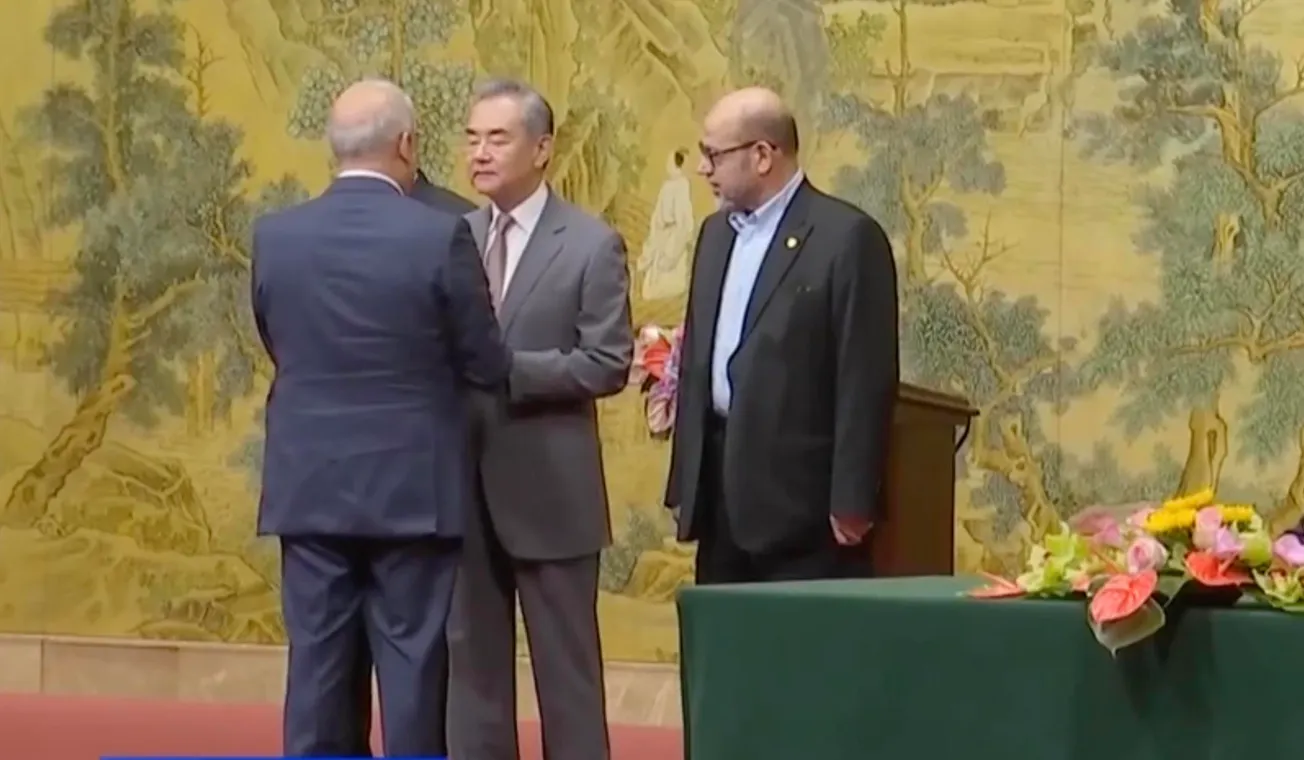China is playing an oversized role in current global diplomatic efforts to bring about peace in the various theaters of war around the world, each of which could escalate to thermonuclear confrontation more rapidly than most care to imagine.
After three days of intense talks in Beijing this week with 14 factions of the Palestinian Resistance, Chinese Foreign Minister Wang Yi was able to work out an agreement to have a unified approach on a three-step process to bring peace to the region and move to Palestinian statehood. The hope is to forge a peace agreement with Israel and its patrons for the entire Southwest Asian region.
Immediately after that, Wang met on July 23 in Guangzhou with visiting Ukrainian Foreign Minister Dmytro Kuleba, who stated that “Ukraine is ready and willing to engage in dialogue and negotiations with Russia … aimed at achieving a just and lasting peace.” Kuleba added that Ukraine had “carefully studied the six-point consensus” reached by China and Brazil on a political solution to the Ukrainian war. At the same time, Vatican Secretary of State Cardinal Pietro Parolin was in Kyiv, where he met with Ukrainian President Volodymyr Zelenskyy, who stated: “I think all of us understand that we have to finish the war as soon as possible of course, not to lose people’s lives.”
Wang was cautiously optimistic about these developments, noting that “recently, both Ukraine and Russia have sent signals of willingness to negotiate to varying degrees.”
If there is to be any true peace for tortured Gaza, it will require the rapid reconstruction and development of the entire region along the lines specified in LaRouche’s Oasis Plan. It is only China and its allies in the BRICS that are in a position to launch such a massive development project.
The rebuilding of a neutral, de-nazified Ukraine—which has already lost over a half-million people, including the flower of its youth, to NATO’s bloody war against Russia—will also need massive energy, transportation and other infrastructure inputs as part of China’s Belt and Road Initiative.
Just as the collapse of the trans-Atlantic financial system is behind the West’s drive for war, the drive for development—and the hope it brings with it—is the only basis for a lasting peace. The just-concluded Third Plenary Session of the Communist Party of China adopted a top-down focus on scientific and technological innovation as the basis of economic growth, not only for China but for its international partners as well. This policy is emblematically reflected in China’s commitment to develop the first industrial prototype fusion reactor by 2035, with a target of large-scale commercial production of fusion energy by 2050.
This is a goal which the United States itself could have met, had it but adopted a Manhattan Project-style commitment to thermonuclear power development, as Lyndon LaRouche for over 50 years insisted was essential. In fact, the name “LaRouche” is almost synonymous with “fusion energy” around the world, such as in the United States, where he and his associates established the Fusion Energy Foundation in 1974.
It is not too late. The political, electoral, economic and institutional chaos sweeping across the West like a tidal wave, opens up opportunities for fundamental change, even as it poses the gravest of dangers.
Schiller Institute founder Helga Zepp-LaRouche addressed these developments in her July 24 weekly Dialogue webcast:
“If these two messages [from Ukraine’s President and Foreign Minister] actually hold, this could be the long-hoped for end to this war. Many steps still have to be taken, but I think it’s extremely promising, it’s extremely hopeful. The fact that this is happening with the mediation of China, very obviously, and I would not neglect the role of the diplomatic mission of Prime Minister Orbán of Hungary” in traveling to Kyiv, Moscow, Beijing and Mar-a-Lago earlier this month. “This had a big input on the effort to get the negotiations to end the war.”
“I just want to say this is very good news,” Zepp-LaRouche explained, “and it just proves that those people who went absolutely crazy in the European Union—like Ursula von der Leyen, who was trying to punish Prime Minister Orbán—they are proven to be utterly wrong. The role of China as a mediator should not be underestimated.”
Zepp-LaRouche continued: “I think the role of China is, in all of these cases, extremely noticeable and positive, and that shows again how absolutely wrong the NATO declaration of the recent NATO summit in Washington was, which described China as a challenge to the Euro-Atlantic security order. They should really review their thinking, because China is doing something important and positive in several parts of the world, and NATO is on the wrong track. But given the fact that these people are sitting on the highest horse possible, it does require some more messages before they get it.”
She concluded: “It just makes me very hopeful, because the Schiller Institute and I have been campaigning that, in the age of thermonuclear weapons, you cannot have war as a way to settle conflicts; diplomacy and negotiations are the only way to go. These recent developments really show that there are hopefully enough people of reason to avoid a thermonuclear war before it is too late … but I think this is a very hopeful sign for all of humanity.”







